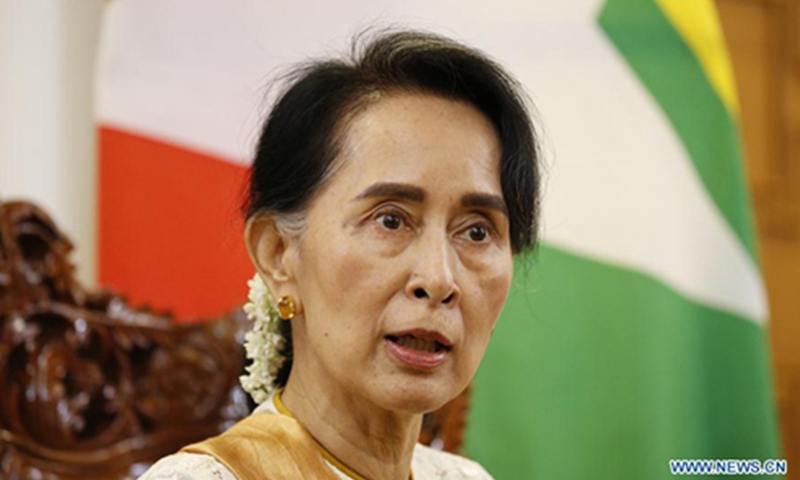Upcoming Myanmar elections a litmus test for NLD’s economic policies, ruling ability
By Bi Shihong Source: Global Times Published: 2020/10/18 18:43:40

Aung San Suu Kyi Photo: Xinhua
The 2020 Myanmar general election is scheduled to be held on November 8. The last election was held in November 2015, during which the National League for Democracy (NLD) led by Aung San Suu Kyi won the majority of seats in the National AssemblyCompared with the two general elections in 2010 and 2015, the 2020 general election is not arousing widespread attention from the international community. Domestically, there is little enthusiasm among the Myanmar people for the coming vote too. Despite this, the general election is a test of Myanmar's political transition and economic and social development. It is also a crucial litmus test of the NLD's ability to rule properly.
When the NLD came to power, it announced that it would strive to achieve three major tasks: national reconciliation, economic development, and constitutional changes. However, little progress in promoting national reconciliation has been made. Religious harmony and amendments to the constitution are not viewed as satisfactory by most people. The struggle between ethnic political parties and the NLD has in fact intensified.
Politically, the NLD government has basically maintained stability yet slow development of the country. The NLD has adopted a prudent attitude in handling relations with the military. It has also bypassed the constitutional restrictions and specially tailored the post of State Counselor for Aung San Suu Kyi. This posture reflects NLD's actual governing style.
Economically, although Myanmar has good conditions for economic development, the economic achievements of the NLD have not met the expectations of the people. Compared with the U Thein Sein government, the GDP growth rate and foreign direct investment during the period of the NLD government decreased significantly. The kyat devalued significantly and the improvement of people's livelihood has been limited. As a result, Myanmar's public expectations of the NLD have dropped, and some of the votes in the 2020 general election may split sharply along party lines - with some swaying even to other parties.
The far-from-satisfactory economic performance of the NLD is mainly due to the frequent occurrence of ethnic and military conflicts in Myanmar. These clashes have undermined the formerly stable development environment. Moreover, the rise of domestic political populism, environmental extremism, and resource nationalism in Myanmar has hit the enthusiasm of foreign investors, and eroded Myanmar's competitiveness. They have further affected the transition of an economy based on resource superiority.
Diplomatically speaking (especially since 2018), Myanmar's relations with Western countries have continued to be tense due to the refugee issue in Rakhine state and related factors. Western countries strongly accused the NLD of ineffective responses. They successively cancelled a number of honors previously won by Suu Kyi, imposed sanctions on Myanmar's senior military officers and some senior government officials, and pushed the International Criminal Court to impose sanctions on Myanmar's military officers involved in refugee issues affecting Rakhine state.
Although Western countries are full of arrogance and prejudice on the issue of human rights, the NLD was not afraid of pressure and chose to keep consistent positions with the military to safeguard the core interests of the country. In December 2019, Suu Kyi even led a delegation to attend a hearing at The Hague in order to defend the NLD government.
In order to alleviate the pressure caused by the deterioration of relations with the West, the NLD government vigorously maintains friendly and cooperative relations with China, India, Japan and other Asian neighboring countries. It has made great achievements to obtain aid, strives to attract investment for projects, and actively promotes trade cooperation.
Since the global outbreak of COVID-19 in 2020, the NLD government has actively cooperated with the international community, including China, and adopted various measures to control the virus. China has also done its best to send medical experts to Myanmar, supplied substantial pandemic prevention materials, and provided technical guidance. The effective measures taken by the NLD government in fighting the disease are expected to help it win the support of voters. To sum up, the NLD won widespread support from the Myanmar people in the 2015 general election with an overwhelming advantage. The people all hope that a responsible government can quickly lead them out of the swamp of poverty and backwardness and the quagmire of civil war. With the approach of the 2020 general election, the NLD's term of office seems to be running out. It remains to be seen whether the NLD will pass this next crucial leadership test.
The author is a professor at the Center for China's Neighbor Diplomacy Studies and School of International Studies, Yunnan University. opinion@globaltimes.com.cn
Posted in: ASIAN REVIEW